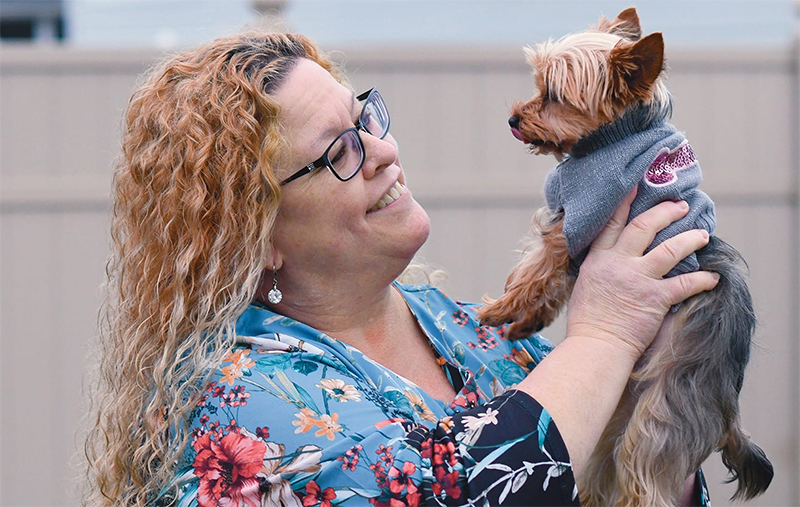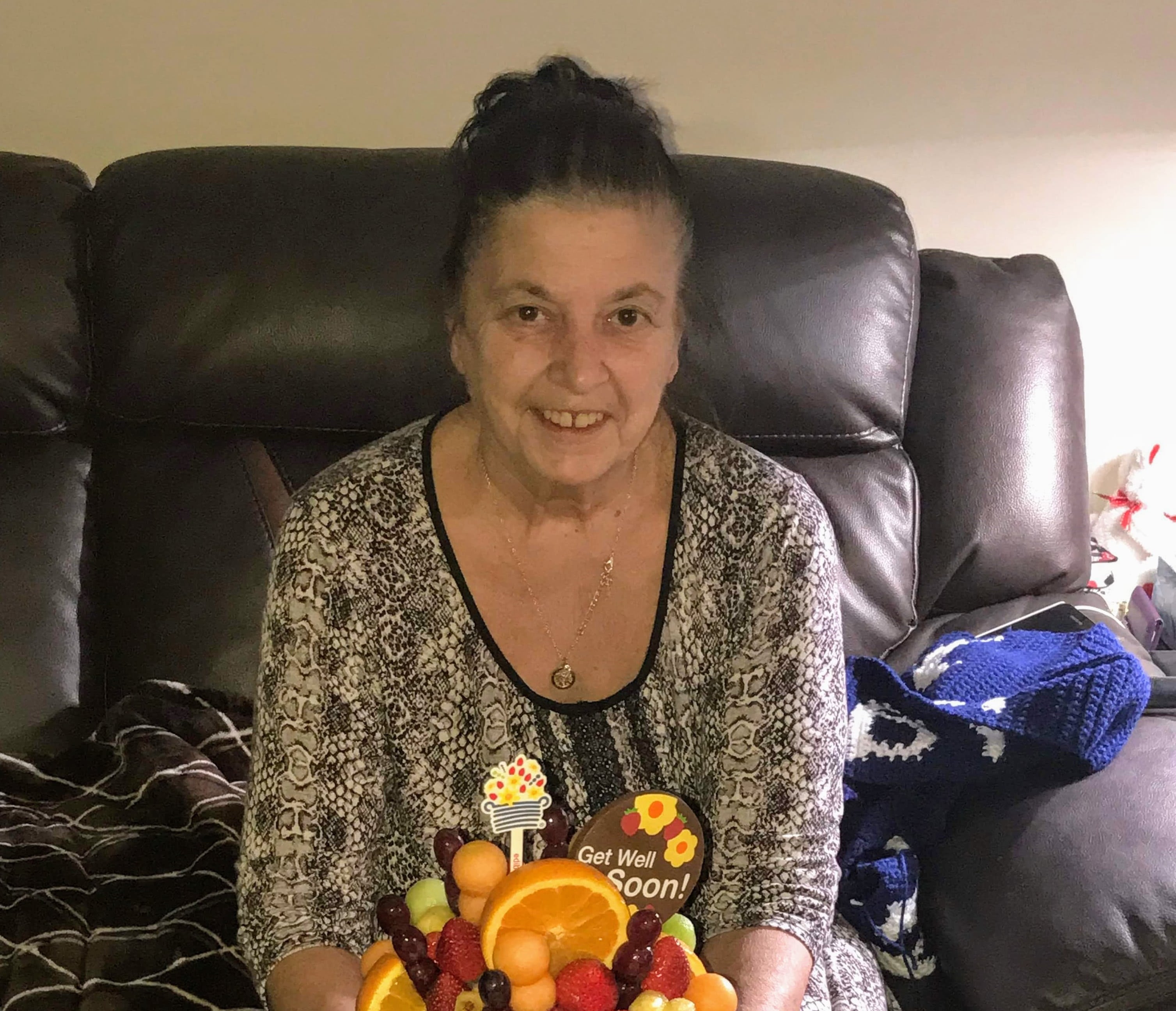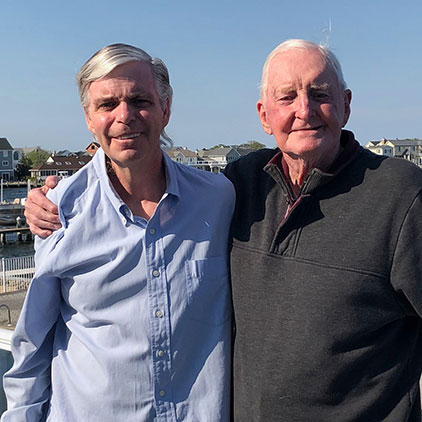

Diana Doran leans on a timeworn baseball analogy when thinking back to the day in 2017 that doctors told her she had cancer in her left kidney—years after losing her right kidney to the same disease and undergoing a hysterectomy to eradicate pre-cancerous uterine cells. “I figured three times and you’re out,” says the Hazlet, New Jersey, resident, 62. “I thought it was the end of my life.”
But a home run was possible. Doctors at Jersey Shore University Medical Center saved Diana’s life and spared her kidney using robotic surgery that removed only the tumor, allowing the organ to continue functioning normally. With encouragement from her surgeon, Mark Perlmutter, M.D., she’s also taking part in a groundbreaking clinical trial at Jersey Shore using immunotherapy that could lower the odds of her cancer returning.
“Diana’s case is a great example of how we can do cutting-edge surgeries in challenging scenarios and also offer patients the latest research trials,” says Dr. Perlmutter, who is the medical director of urologic oncology for Hackensack Meridian Health Cancer Care for Monmouth and Ocean counties. “On all fronts, it shows we’re really at the forefront of medical care.”
Adds David Greenberg, M.D., medical oncologist and hematologist at Jersey Shore and Ocean Medical Center, who is running the trial, “We have a lot of effective treatments but are always looking to do better,” he says. “This trial is a great example of how we are attempting to change the current standard of care and give our patients a chance to possibly live longer and disease-free.”
Minimally Invasive Approach
Diana, a secretary for the past four years at Hackensack Meridian Health’s Raritan Bay Medical Center, immediately knew she’d seek treatment at Jersey Shore after her latest kidney cancer diagnosis. She had lost her right kidney to cancer in 1995, but she no longer had a spare organ to take over urinary function and faced the terrifying possibility of ongoing dialysis if her remaining kidney were removed.
Because of her tumor’s location at the kidney’s edges, Dr. Perlmutter was able to offer Diana a partial nephrectomy, removing just the tumor using cutting-edge robotic surgery. This minimally invasive procedure, which enables surgeons to operate using a 3-D camera and tiny surgical tools, minimizes blood loss and post-operative pain and speeds recovery time.
“It’s a challenge, because normally when you do kidney surgery, you know the patient has another kidney,” Dr. Perlmutter explains. “With Diana, there was no safety net and no room for error.”
Innovative Research Since Diana also had kidney cancer previously, Jersey Shore team members knew she was at high risk for her cancer to return. They suggested Diana enroll in a novel study at the hospital examining whether immunotherapy could lower those odds. Also known as biologic therapy, immunotherapy is approved for many forms of cancer, using substances made in the body or a laboratory to harness the immune system’s ability to fight off cancer cells.
The study—part of an ongoing multi-center, national trial—is double-blinded, meaning neither Diana nor her doctors know if she received the two immunotherapy drugs or a placebo during infusions every other week for nearly six months. But all agreed she was an ideal candidate to be part of the pioneering research. Only one drug is currently approved to lower the odds of kidney cancer recurrence, but it typically causes terrible side effects, Dr. Greenberg says.
“Diana is someone we do want to take every precaution with to prevent a third occurrence of kidney cancer,” he adds. “We try to identify as many people as possible who might benefit from new therapies. Trials are long, but they are the only way to know if we’re making progress.”
Safe and Secure
Today, Diana remains cancer-free. She credits her doctors, husband Michael, daughter Jennifer and Jersey Shore clinical research coordinator, Diane Russomanno, for their unwavering support. She also recognizes her dog Ellie for being a major source of comfort during recovery. “I have a whole team and so many eyes on my scans and my care that if something comes up, they’re going to find it pretty quick. I feel very safe and secure.”
New Hope for Cancer Care
Keeping tabs on her health after kidney cancer treatment at Jersey Shore periodically brings Diana to the new HOPE Tower, which opened in 2018. While she’s thrilled to be done with active therapy, Diana can’t help but ogle the 10-story facility’s beautiful infusion room, where more than 30 patients can receive chemotherapy in the comfort of heated chairs.
The 10-story outpatient center—home to a world-class, two-story cancer treatment center featuring an infusion suite, radiation oncology, counseling and supportive care—has redefined cancer care at Jersey Shore. In addition, the outpatient center features an academic and research center and leading experts with clinical offices in more than 15 specialties, such as pediatrics, rheumatology, obstetrics and gynecology, psychiatry and behavioral health.
“Having doctors under one roof is not only comforting for patients, but it’s better for care,” says Dr. Greenberg. “It’s almost over the top how many people are looking after patients—and there’s no such thing as too much care.”
Adds Dr. Perlmutter, “It’s a great asset for patients to be able to see multiple physicians and have their therapies all in one location, and a great convenience we can offer patients.”
Next Steps & Resources
- Meet your sources: Mark Perlmutter, M.D., David Greenberg, M.D.
- To make an appointment with Mark Perlmutter, M.D., David Greenberg, M.D. or another provider, call 800-822-8905 or visit our website
Find a doctor near me
Weight-loss Surgery Leads to Unexpected Discovery for Seaside Heights Mother

Cancer Collaboration Brings Lifesaving John Theurer Cancer Center Clinical Trial to Washington, D.C., Native

Metuchen Mother and Grandmother Fights Bladder Cancer With Robotic Surgery
